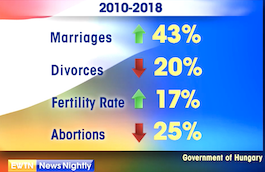The West can learn a lot from Hungary’s pro-family policies
- CHAD PECKNOLD
Many liberal democracies are facing a social crisis today because their governments pursued policies which undermined the family.
 Katalin Novak
Katalin NovakBut since 2010, one country has seen marriage rates increase by a whopping 43 per cent with their divorce rate dropping by 22.5 per cent. Unsurprisingly, with the increase in marriage, 33 per cent fewer women are having abortions today than they were eight years ago. Likewise the national birth rate is currently at its highest in 20 years.
The country is Hungary. And earlier this month their parliament just passed a second round of sweeping pro-family policies. While other countries fret about how immigration trends will shape their destiny, Hungarians are actually solving their demographic crisis by a different path.
Hungary's Minister for the Family, Katalin Novak, explains how their pro-family strategy faced profound opposition which they had to overcome if they wanted to save their country from social decline:
 "After we won the election in 2010 with a two-thirds majority, we decided to build a family-friendly country and to strengthen families raising children. We thought the opposition would be a partner in this, but since then there have been very few decisions in the field of family policy that they've supported. So if we had always taken the opposition's opinion into account, Hungary would now be on the brink of collapse. There wouldn't be such a comprehensive family-support system, a family-friendly tax system, a housing program, 800,000 new jobs, and many opportunities to create a balance between life and work. The socialists have driven our country into deep crisis before, and they would do it again. They're only interested in grabbing power again; to achieve this goal, they've even joined forces with the Hungarian far right."
"After we won the election in 2010 with a two-thirds majority, we decided to build a family-friendly country and to strengthen families raising children. We thought the opposition would be a partner in this, but since then there have been very few decisions in the field of family policy that they've supported. So if we had always taken the opposition's opinion into account, Hungary would now be on the brink of collapse. There wouldn't be such a comprehensive family-support system, a family-friendly tax system, a housing program, 800,000 new jobs, and many opportunities to create a balance between life and work. The socialists have driven our country into deep crisis before, and they would do it again. They're only interested in grabbing power again; to achieve this goal, they've even joined forces with the Hungarian far right."
The new law which comes into effect July 1 has a new set of pro-family incentives such as a 3,000 euro mortgage reduction for a second child, and a 12,000 euro reduction for a third. Effective in 2020, mothers with 4 or more children will enjoy a lifetime personal tax exemption. Katalin Novak says that socialist opposition to pro-family policies remains entrenched but since they are more interested in power than in proposals that make for stronger families, she believes such opposition will grow weaker.
The family is one of the "necessary societies" in Catholic teaching. As Pope St John Paul II once put it, "as the family goes, so goes the nation and so goes the whole world in which we live." Hungary is proving that pro-family policies are better for nations than those policies which deracinate and diminish the family by the whims of ideological dictate.


 This is Meaghen Gonzalez, Editor of CERC. I hope you appreciated this piece. We curate these articles especially for believers like you.
This is Meaghen Gonzalez, Editor of CERC. I hope you appreciated this piece. We curate these articles especially for believers like you.
Please show your appreciation by making a $3 donation. CERC is entirely reader supported.

Acknowledgement
 Chad Pecknold. "The West can learn a lot from Hungary's pro-family policies." Catholic Herald (April 25, 2019).
Chad Pecknold. "The West can learn a lot from Hungary's pro-family policies." Catholic Herald (April 25, 2019).
Reprinted with permission of the Catholic Herald. The Catholic Herald is a London-based magazine, established as a newspaper in 1888 and published in the United Kingdom and the Republic of Ireland.
The Author
 Chad Pecknold received his PhD from the University of Cambridge (UK) and since 2008 he has been a Professor of Historical & Systematic Theology in the School of Theology at The Catholic University of America in Washington, DC. He teaches in the areas of fundamental theology, Christian anthropology, and political theology. Pecknold is the author of a number scholarly articles and books including most recently, Christianity and Politics: A Brief Guide to the History and The T&T Clark Companion to Augustine and Modern Theology. Dr. Pecknold is also a frequent contributor to debates in the public square, writing regular columns for First Things and National Review on a range of topics related to the importance and impact of Church teaching on social and political questions.
Chad Pecknold received his PhD from the University of Cambridge (UK) and since 2008 he has been a Professor of Historical & Systematic Theology in the School of Theology at The Catholic University of America in Washington, DC. He teaches in the areas of fundamental theology, Christian anthropology, and political theology. Pecknold is the author of a number scholarly articles and books including most recently, Christianity and Politics: A Brief Guide to the History and The T&T Clark Companion to Augustine and Modern Theology. Dr. Pecknold is also a frequent contributor to debates in the public square, writing regular columns for First Things and National Review on a range of topics related to the importance and impact of Church teaching on social and political questions.




